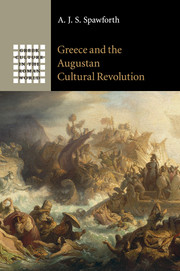Book contents
- Frontmatter
- Contents
- Illustrations
- Acknowledgments
- Chapter 1 Introduction
- Chapter 2 ‘Athenian eloquence and Spartan arms’
- Chapter 3 ‘The noblest actions of the Greeks’
- Chapter 4 ‘The gifts of the gods’
- Chapter 5 ‘Constructed beauty’
- Chapter 6 Hadrian and the legacy of Augustus
- Conclusion
- Bibliography
- Index
- References
Chapter 6 - Hadrian and the legacy of Augustus
Published online by Cambridge University Press: 05 November 2011
- Frontmatter
- Contents
- Illustrations
- Acknowledgments
- Chapter 1 Introduction
- Chapter 2 ‘Athenian eloquence and Spartan arms’
- Chapter 3 ‘The noblest actions of the Greeks’
- Chapter 4 ‘The gifts of the gods’
- Chapter 5 ‘Constructed beauty’
- Chapter 6 Hadrian and the legacy of Augustus
- Conclusion
- Bibliography
- Index
- References
Summary
Augustan greece in larger context
Before leaving Augustus, it is worth standing back to ask whether his regime treated Athens, and Greece as a whole, any differently from other traditional centres of cultural prestige in the Hellenistic world. Taking Alexandria first, both Plutarch and Dio report the speech delivered by Octavian in the Alexandrian gymnasium in 30 bc following the death of Cleopatra and Antony, in which he forgave the Alexandrians and Egyptians in part, he said, because he admired the ‘beauty and size’ of the city.
Strabo records how, along the coast 5.4 kilometres to the east, he proceeded to found another Nicopolis on the site of his defeat of Antony's forces; here likewise he provided facilities for the celebration of quinquennial victory games. The parallel with Nicopolis in Epirus is clear, although in Egypt Octavian merely founded what Strabo calls a ‘suburb’ (proasteion), not a fully-fledged polis. Despite Octavian's professed admiration for Alexandria as a city, the same author states that this new Nicopolis brought about the neglect and near-abandonment of civic and religious buildings in the older settlement. Alexandrian Nicopolis symbolised the humiliation of the Graeco-Ptolemaic dispensation, marked by Octavian's forced annexation of Egypt as a Roman province and garrisoning of the old royal capital with three legions; under Tiberius this garrison was stationed precisely in the old Roman camp at Nicopolis. There are other signs of imperial building, including a Forum Iulium ‘given’ by the first prefect, Cornelius Gallus, and a Caesareum in Alexandria, possibly begun by Cleopatra, where Augustus was worshipped. These expressions of Roman power apart, however, there is little or no sign that Augustus, who visited Alexandria just the once, actively sought to restore its Ptolemaic glory-days as a centre of cultural Hellenism, even if the Museum now passed from royal to imperial control. On the other hand, the Augustan settlement of Egypt overall, with its emphasis on the security and exploitation of the richest by far of all Rome's provinces, is seen nowadays as a ‘decisive turning point’.
- Type
- Chapter
- Information
- Greece and the Augustan Cultural Revolution , pp. 233 - 270Publisher: Cambridge University PressPrint publication year: 2011

